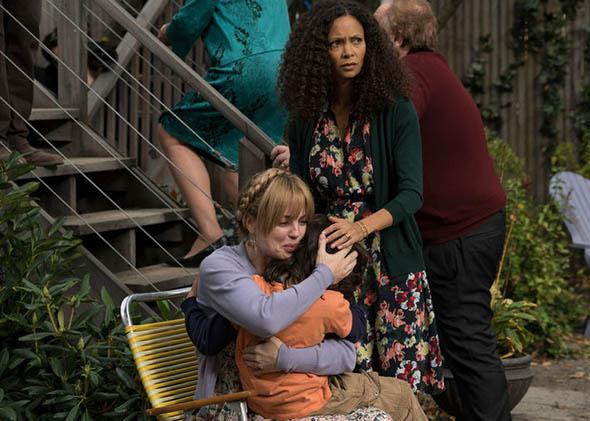The Slap is exactly the sort of prestige project that the beleaguered major networks should be making. Why leave all the gloss and glory—all the movie stars, all the movie directors, all the limited-run series they are willing to sign on for, and all the attendant attention and awards—to cable? NBC’s eight-episode The Slap stars Peter Sarsgaard, Uma Thurman, Zachary Quinto, Thandie Newton, and Brian Cox, among others. Directed by Lisa Cholodenko, who most recently helmed HBO’s Olive Kitteridge, the series has been adapted for American television by the playwright Jon Robin Baitz from an Australian show that itself was adapted from a novel. It examines the aftereffects of a controversial physical altercation—a man slapping a small boy—in the most philoprogenitive corners of Brooklyn, New York. But add all this up, and what results is not an elegant, adult, psychologically astute miniseries. Instead, The Slap is a bulldozer: bluntly, gracelessly effective.
The inciting incident of the series, the eponymous slap, takes place at Hector’s (Sarsgaard’s) 40th birthday party. Hector is a civil servant and married to Aisha (Newton); he’s the father of two biracial tweenagers, the son of Greek immigrants, and seemingly the quintessential milquetoast, decent guy—if he weren’t in the early stages of an affair with his children’s high school–aged baby-sitter. Assembled to celebrate him are his cousin Harry (Quinto), a rich, aggressive, Darwinian car salesman whose lawyer pal unironically describes him as a “1 percenter”; Harry’s wife, Sandi (Marin Ireland); Anouk (Thurman), a TV writer who arrives with her new, much younger actor boyfriend (Penn Badgley); Hector’s overbearing Greek parents (Brian Cox and Maria Tucci); Aisha’s best friend Rosie (Melissa George, reprising her role from the Australian series), who is still breast-feeding her 4-year-old son, Hugo (Dylan Schombing); Rosie’s husband, Gary (The Newsroom’s Thomas Sadoski), an artist who reviles Harry; and Connie (Makenzie Leigh), the baby-sitter. Over the course of the party, various low-level domestic tensions flare up, culminating in Harry slapping Rosie and Gary’s son, the completely undisciplined Hugo.
Each episode is told from the point of view of one of the characters, a shifting perspective highlighted by a narrator (Victor Garber), who provides The Slap with its cloying, overly literary voice-overs. “On the day before his 40th birthday, Hector had only one thing on his mind—Connie,” the narrator begins the first episode. “Harry knew one thing in life, that his anger was a form of energy, and it had served him well, except when it hadn’t,” starts the second. This narration is at tonal odds with the series’ attempts to achieve some kind of psychological realism. Every time the narrator pipes up, we are suddenly watching events take place through a glass of faux-Updike. (What is bougie Brooklyn but the ’burbs?) It has a distancing effect, counterproductively draining urgency from a series about the various ways adults, too, lack impulse control.
And my, how they lack it. Hector may be flirting with a teenager, but Harry and Rosie quickly emerge as the most overtly inflexible adults assembled. They are matched caricatures, philosophically opposed and yet fundamentally similar, absolutely, unalterably convinced of their rightness and their righteousness. One imagines getting them going on the subject of vaccinations, for example, would be a brownstone-leveling event. The Slap is set in the extremely affluent neighborhoods of Brooklyn, where a backyard kerfuffle counts as a catastrophic incident, but you can see Baitz reaching for a grander meaning, a diagnosis of the American condition in which ideologues on both sides do battle the self-defeating way, both in the highly contentious realm of parenting and beyond it as well.
The conservative-liberal allegory is not particularly subtle: Harry is a hypermacho alpha-male with an explosive temper who understands America as a place where a man either takes or gets taken. (Quinto has been very well-cast: Harry has a number of abhorrent qualities, and Quinto keeps him just this side of not entirely detestable.) Rosie is the hyperpermissive, ultraprotective mother who blames everyone but herself for her son’s wild behavior and looks to resolve things by dragging everyone though the legal system. When the two face off, there is no possibility of reasonable compromise. Harry’s and Rosie’s personalities and philosophies are the plot of The Slap: the unalterable factors that determine everything else that happens.
The Slap can be didactic, diffident, cartoonish, yet despite being not quite good, I found it impossible to watch without emotionally engaging. It would be easier to turn the show off than to have no opinion about whether Hugo deserved to be slapped, about whether Harry or Rosie and Gary are more to blame. In this way, too, The Slap resonates with contemporary political conversation: How much junk punditry have we let make us hot under the collar? The Slap, graceless as it can be, is a conversation piece. Skip it, or argue about it.
